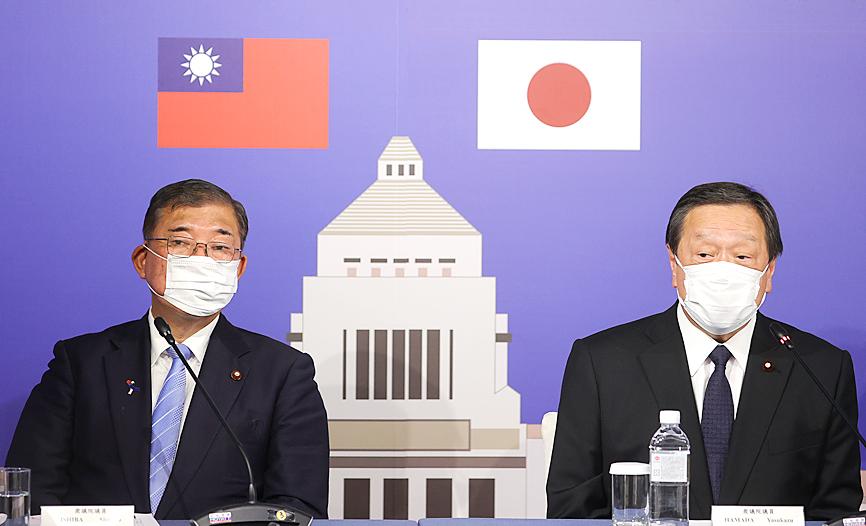Support for Taiwan in the Japanese Diet is bipartisan and would remain unchanged after the assassination of former Japanese prime minister Shinzo Abe, a visiting delegation of Japanese lawmakers told a news conference in Taipei yesterday.
The Japanese parliament recognizes the importance of Japan-Taiwan relations, and has shown bipartisan sympathy and support for Taiwan, said former Japanese minister of defense Shigeru Ishiba, who led the four-member delegation to Taiwan for a four-day visit.
The efforts to further develop and promote bilateral relations are to continue after Abe’s sudden death, added Ishiba, who was Japan’s defense minister from 2007 to 2008.

Photo: CNA
Abe died on July 8 at the age of 67, hours after being shot twice by a man using a makeshift shotgun during an election campaign event on a street in Nara, near Osaka.
The longest-serving Japanese prime minister was viewed by many in Taiwan as a staunch supporter of the nation.
Echoing Ishiba’s views, former deputy minister of defense Akihisa Nakashima said that promoting Japan’s ties with Taiwan had never relied solely on the late former prime minister, but that it was the effort of Diet members across party lines.
The delegation, which consists of lawmakers focusing on defense affairs, visited Taiwan to discuss with officials how the two sides could collaborate on security matters, Nakashima said.
Some European nations had swiftly increased their engagements with Taiwan in the wake of the Russian invasion of Ukraine, Nakashima said, adding that Japan should make similar efforts to elevate its relations with Taipei.
The delegation, which also includes former Japanese minister of national defense Yasukazu Hamada and Diet member Takayuki Shimizu, has since their arrival on Wednesday met with President Tsai Ing-wen (蔡英文), Vice President William Lai (賴清德), Premier Su Tseng-chang (蘇貞昌) and Chinese Nationalist Party (KMT) Chairman Eric Chu (朱立倫).
Asked what security cooperation details were discussed with Taiwanese officials, Ishiba declined to comment, citing confidentiality, but added that the visit provided the delegation with a better understanding of the Taiwanese military’s command and control operations.
The delegation hopes that these insights can contribute to developing Japanese security policy, Ishiba added.
While Japan has the responsibility to contribute to peace and stability in the Asia-Pacific region, whether its defense forces should intervene in the event of a regional conflict remains to be discussed in the country, Ishiba said.
The delegation ended the trip and left for Japan yesterday.
The news conference followed a visit by the delegation to former president Lee Teng-hui’s (李登輝) grave at a New Taipei City military cemetery, where the delegates paid their respects to Lee, who died two years ago.
They were accompanied by ambassador-at-large for digital New Southbound Policy initiatives Lin Chia-lung (林佳龍), according to the Lee Teng-hui Foundation.
Lin is also the Democratic Progressive Party’s New Taipei City mayoral candidate in November’s local elections.
Lee, Taiwan’s first popularly elected president, who passed away at the age of 97, spoke fluent Japanese and was known for his Japan-friendly views.

The Central Election Commission has amended election and recall regulations to require elected office candidates to provide proof that they have no Chinese citizenship, a Cabinet report said. The commission on Oct. 29 last year revised the Measures for the Permission of Family-based Residence, Long-term Residence and Settlement of People from the Mainland Area in the Taiwan Area (大陸地區人民在台灣地區依親居留長期居留或定居許可辦法), the Executive Yuan said in a report it submitted to the legislature for review. The revision requires Chinese citizens applying for permanent residency to submit notarial documents showing that they have lost their Chinese household record and have renounced — or have never

A magnitude 5.6 earthquake struck off the coast of Yilan County at 12:37pm today, with clear shaking felt across much of northern Taiwan. There were no immediate reports of damage. The epicenter of the quake was 16.9km east-southeast of Yilan County Hall offshore at a depth of 66.8km, Central Weather Administration (CWA) data showed. The maximum intensity registered at a 4 in Yilan County’s Nanao Township (南澳) on Taiwan’s seven-tier scale. Other parts of Yilan, as well as certain areas of Hualien County, Taipei, New Taipei City, Taoyuan, Hsinchu County, Taichung and Miaoli County, recorded intensities of 3. Residents of Yilan County and Taipei received

Taiwan has secured another breakthrough in fruit exports, with jujubes, dragon fruit and lychees approved for shipment to the EU, the Ministry of Agriculture said yesterday. The Animal and Plant Health Inspection Agency on Thursday received formal notification of the approval from the EU, the ministry said, adding that the decision was expected to expand Taiwanese fruit producers’ access to high-end European markets. Taiwan exported 126 tonnes of lychees last year, valued at US$1.48 million, with Japan accounting for 102 tonnes. Other export destinations included New Zealand, Hong Kong, the US and Australia, ministry data showed. Jujube exports totaled 103 tonnes, valued at

BIG SPENDERS: Foreign investors bought the most Taiwan equities since 2005, signaling confidence that an AI boom would continue to benefit chipmakers Taiwan Semiconductor Manufacturing Co’s (TSMC, 台積電) market capitalization swelled to US$2 trillion for the first time following a 4.25 percent rally in its American depositary receipts (ADR) overnight, putting the world’s biggest contract chipmaker sixth on the list of the world’s biggest companies by market capitalization, just behind Amazon.com Inc. The site CompaniesMarketcap.com ranked TSMC ahead of Saudi Aramco and Meta Platforms Inc. The Taiwanese company’s ADRs on Tuesday surged to US$385.75 on the New York Stock Exchange, as strong demand for artificial intelligence (AI) applications led to chip supply constraints and boost revenue growth to record-breaking levels. Each TSMC ADR represents